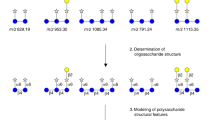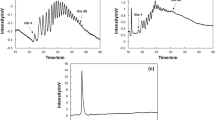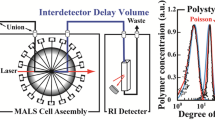Abstract
MANY mobile phases are found in the paper chromatography of sugars; but the separation of sucrose, fructose and glucose is somewhat difficult, because their R F values are very near each other1. The separation is enough for identification purposes, but it is not good enough for elution or photometric readings, because the sugars are still partly mixed. The solvent suggested below divides the sugars quite well with the following R F values (at 20° C.): sucrose, 0.17; glucose, 0.26; mannose, 0.30; arabinose, 0.32; fructose, 0.32; xylose, 0.33; ribose, 0.41.
This is a preview of subscription content, access via your institution
Access options
Subscribe to this journal
Receive 51 print issues and online access
$199.00 per year
only $3.90 per issue
Buy this article
- Purchase on Springer Link
- Instant access to full article PDF
Prices may be subject to local taxes which are calculated during checkout
Similar content being viewed by others

References
Lederer, M., and Lederer, E., Chromatography, 158 (Elsevier Pub. Co., 1953).
Giovannozzi-Sermanni, G., I° Congrès International Scientifique du Tabac., Paris, 7–14 Septembre, 1955.
Author information
Authors and Affiliations
Rights and permissions
About this article
Cite this article
GIOVANNOZZI-SERMANNI, G. A New Solvent for Quantitative Paper Chromatography of Sugars. Nature 177, 586–587 (1956). https://doi.org/10.1038/177586b0
Issue Date:
DOI: https://doi.org/10.1038/177586b0
This article is cited by
-
High-temperature storage of potatoes with the aid of sprout inhibitors
European Potato Journal (1963)
-
Absorption and utilization of 3-phosphoglyceric acid by green gram plants
Die Naturwissenschaften (1961)
-
The sugar accumulation in potatoes kept at a low temperature, as studied in a small selection of samples of Dutch varieties
European Potato Journal (1960)
Comments
By submitting a comment you agree to abide by our Terms and Community Guidelines. If you find something abusive or that does not comply with our terms or guidelines please flag it as inappropriate.


